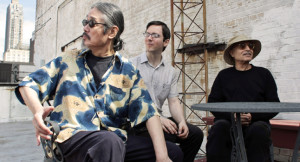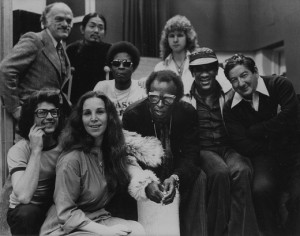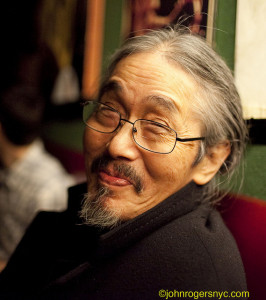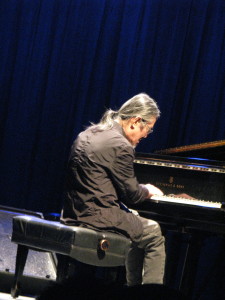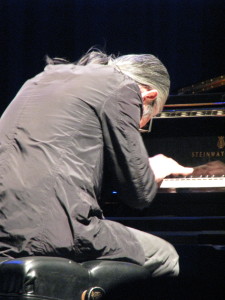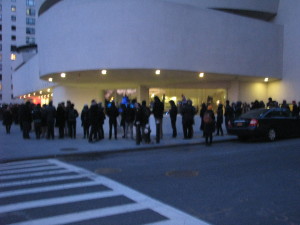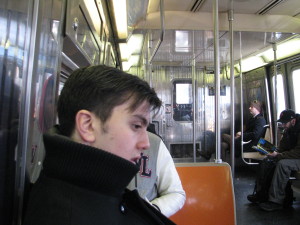M a s a b u m i K i k u c h i, he left yesterday …
wieder eine Welt untergegangen
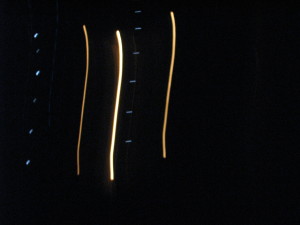
©FoBo_
Archives: Masabumi Kikuchi
2015 8 Juli
Poo died
Henning Bolte | Filed under: Blog | RSS 2.0 | TB | Tags: Masabumi Kikuchi | Comments off
2015 8 Juli
BROOKLYN 4: An afternoon with Poo
Henning Bolte | Filed under: Blog | RSS 2.0 | TB | Tags: Masabumi Kikuchi | 2 Comments
Heavy day-planning: due to physical and other handicaps only the meeting with Masabumi Kikuchi worked out. Masabumi Kikuchi (1939), pianist of the legendary Tethered Moon Trio with bassist Gary Peacock and drummer Paul Motian, released the trio-album Sunrise (ECM) with young bassist Thomas Morgan and the late Paul Motian last year, an album ranking high on my 2012-favorites-list (one of my RADIO-ON-DEMAND items: listen HERE). I am happy that it is becoming real to meet him. Great moment! Here’s a first rendition with impressions of that afternoon (a thorough article will appear later).
A Time Ago
It all began twenty years ago, 1993, in Gonneville, a small village in Normandy. I went there to work in seclusion to finish my Ph.D.thesis. My stay there was strongly, indelibly connected to the music I was listening to intensely: Triangle by Tethered Moon and If You Look Far Enough by Arild Andersen, Ralph Towner, Nana Vasconcelos and Audun Kleive. The opener of Triangle titled Little Abi was a revelation for me and is deeply stamped into my memory. Never before I had heard something like that. It stayed with me and every time I listen to music by Poo it is there, it is the starting point. He now told me that Abi is his daughter, born in the seventies (he recorded its first version with Elvin Jones in 1972). Now I am writing this down I suddenly realize that I first stumbled on Arild in a real funny way when arriving at the Paul Motian Tribute next evening.
Another unforgetable moment and precious memory: a nightly listening session years ago with my friend Jaap who was very close to Gil Evans (many stories …). He presented to me Gil’s recording of Kikuchi’s composition Drizzling Rain from Gil’s album Lunar Eclypse (1981).
Poo through the times
Masabumi Kikuchi aka Poo, a long time New York resident, had a close musical relationship to Gary Peacock, Elvin Jones, Gil Evans and during the last two decennia especially to Paul Motian. The last 10 years a Kikuchi-image of the highly wondrous genius existing in seclusion arose.
It is however only part of the story. There is much more than may appear at first sight! But Kikuchi never built on surface-continuity. In the sixties he worked and recorded regularly with Toshiko Akiyoshi and Charlie Mariano, Watanabe, legendary drummer Masahiko Togashi and composer Toru Takemitsu. In the seventies Kikuchi befriended Miles Davis during his post-„Agharta“ retirement period, and recorded a still-unissued session with him (1978). Davis’ group should tour but had to be disbanded due to severe health problems of some of its members. In that period Kikuchi played and recorded with Davis-sidemen like Liebman, Grossman, Foster a.o as well. End of the eighties/beginning of the nineties he also worked and recorded with Bill Laswell, Bernie Worrell and Bootsy Collins. His recorded work is a bit scattered but much of his old work is still available.
Little Abi – it is the tension Poo is able to generate, a tension that brings forth magic duration and beauty of sound. Moon, tethered moon. It is said that his playing changed profoundly during the last years in the Motian-bands. Sure, he took advantage of Motian’s no-rehearsal-principal by trusting and relying on spur-of-the moment discoveries. „Lately when I sit down at the piano I do not prepare what I will play nor do I think about how to play, and I believe I found the way of putting out something new, and I guess I could call it my own.“
Comparing Little Abi to Ballad on the recent Sunrise-album with Paul Motian and Thomas Morgan: in the later there is still more, higher tension, sharper contrast and more abrupt movement. Heavy accents, halts and quick runs. Like certain processes in nature, e.g. breaking/flowing ice. It also inherits an ongoing antithesis of momentary explosive impulses and subsequent freezing of bold and gracious movements which lends sound an object-like quality. Tethered moon: evanescence and sharp contouring to and fro. As catapulting in the art of archery. His music is radically focusing, confronting, not distracting. These qualities are without doubt related a.o. to two strong influences on him, Herb Pomeroy and Gil Evans.
Meet, talk, (tr)eat
We should meet at Neue Galerie, 1048 – 5th avenue/East 86th street, with its Viennese Café Sabarsky. I got out at Lexington Avenue and walked 86th street down to 5th avenue corner. Before entering the building on 86th street, I turned round the corner to check my bag for a few things. At the moment I turned back, I bumped into Masabumi Kikuchi who was approaching from the north on 5th avenue. His left hand was bandaged. He showed me and told that he just had fallen and been bandaged at nearby Mount Sinaï Hospital. Goodness me! Later on I asked him if it would be possible for him to perform at the Motian-tribute next evening. He looked at me with the typical provocative grin of him: „I don’t really need both hands for that!“
Contrary to my expectation it was quite noisy inside the cafe. Kikuchi seemed to be intrigued by the Viennese decor and immediately reacted on spheric things. Triggered by the harsh behavior of the personnel he repeatedly asked me: „Are they from Vienna?“ The noisiness could have caused an extra obstacle given that Poo articulates at a soft level with his voice. It had however a benevolent effect. After a while he adapted his voice to the noise-level of the room.
Connecting to him was easy and heavy at the same time. I experienced that earlier at the phone when we organized our meeting. He picks up topics and questions very quickly but he is not just responding. He actually takes his very own route, interrogating and examining the interviewer. And then there are these restarts, resettings during the conversation. Topics and questions already dealt with are brought up, repeated by him again and again. It is confusing and takes some patience to get along with and some creativity to cope with it. We had a good rapport and that helped us to discuss all relevant matters nonetheless. His answers were sharp and precise too. It became hard however to hold on working through a set of prepared questions. Beter, inescapable to enter free flow conversation also because it is a lot of fun to talk with him. He is sweet, provocating with plenty stories on necessary and productive stubbornness. He repeatedly emphasized that he did not like the all improvised Sunrise-recording made at Avatar-studio on the other side of Central Park in september 2009. Even the titles were supplied by Paul Motian, he told. But when he finally got the finished product, he really liked it. A grin again.
Kikuchi owns a wondrous kind of ignorance. It is already apparent in his notes on Sunrise. The opening: “Suddenly, Paul was gone. He left without warning.” And then he continues:”By the time I visited him in hospital (also the Mount Sinai, HB) for the second time, he was already in the palliative care unit and they wouldn’t let me see him. A week earlier, not long after Paul had admitted, Bill Frisell’s wife and daughter were there to care for him. They kindly left me alone with Paul for a while, and I’ll always be grateful for that … Paul and I talked for close to an hour, but it was pretty much business as usual because, frankly, I had no idea he had so little time left. As soon as he began to look tired I told him I’d visit again soon and went home. And that was it.” Then he continues telling about their first meeting together with Gil Evans, Juini Booth, Airto for a recording with Sting …
On the other hand he clearly acknowlegdes own physical and mental handicaps and described how he turned his loss of control into spontaneous action and creativity. An example is the crossing of his hands when playing. It is a consequence of his loss of flexibility and width of hand span. “This solution occured spontaneously at a certain moment during playing. I learned to give way to these kind of impulses from a deeper level and follow a different modus operandi.”
Company
We were already talking for nearly one and half hour when my nineteen year old son Dikran joined. Kikuchi apparently liked our company so we went on with the three of us. Unfortunately Sabarsky interfered. I had chosen Sabarsky because of their opening hours but just this afternoon they did not keep to it. We were expelled non-gently. We moved to a French restaurant on 86th street and had a delicious dinner there.
After nearly 4 hours having spent together we accompanied Poo to the subway-station at Lexington Avenue and said goodbye trusting that he safely would make his way home to downtown West Village. Next evening Masabumi Kikuchi appeared at the Paul Motian Tribute at Symphony Space contributing a solo and duo with Gary Peacock, his longest musical companionship. He knows him from the time that Peacock lived in Japan (1969-1972). Kikuchi’s contribution: short, intense and the one with the highest tension.
Kikuchi, a highly wondrous genius living in seclusion? No! Kikuchi, a queer customer on a strange trip? No! Kikuchi, an otherwordly sage? No! Rien de tout cela!
There is plenty material he recorded himself playing with extraordinary bassist Thomas Morgan and guitarist Todd Neufeld. He performed with the trio in Japan. His next public appearance in New York will be very soon: a concert with Tyshawn Sorey, another prudent, creative musician AND drummer, Todd Neufeld and … yes, Thomas Morgan. The group debuts new material from Sorey’s forthcoming Pi Recordings album:
17 april, 20:00. Greenwich House Music School, 46 Barrow Street, New York.
Coda: Tyondai Braxton at Guggenheim Museum
Our next stop at one block walking distance: Tyondai Braxton, one of the big acts of famous WARP-label, with HIVE, an electronic event in the rotunda of the Guggenheim Museum or as NYTimes-review wrote: „Fastidious Percussion With Plenty Of Electronics“. When we arrived there was a long queue around the block.
Not only a long queue but it was completely sold out. A clear signal to return to Brooklyn!
More than once Poo just before declared he wouldn’t go there because the construction of the building was badly out of balance. „Not a good place for people to stay“, he said.
photo 1, 3 by the wonderful photographer John Rogers ©, good friend of Paul Motian
photo 4, 5, 6 7 © FoBo – Henning Bolte
2013 27 März
BROOKLYN 1: (von) hier (aus)
Henning Bolte | Filed under: Blog | RSS 2.0 | TB | Tags: Barbes, Brooklyn, Frisell, Hans Wendl, John Hébert, Korzo, Lovano, Lucian Ban, Masabumi Kikuchi, Mat Maneri, Paul Motian, Roulette, Shape Shifter | Comments off
18.März: für ein paar Tage in Brooklyn, 11th Street, 4th Avenue, die Gegend um Park Slope im nordwestlichen Bereich des Stadtteils. Viele Musiker sind hier zuhause und eine Reihe von wichtigen Podien wie Barbés, Korzo, Shape Shifter, Roulette sind in nächster Nähe zu finden. Hauptanlass der Reise: das Paul Motian Tribute-Konzert im Symphony Space am 22.März, organisiert von Bill Frisell, Joseph Lovano und Hans Wendl. Drumherum Gespräche, Freunde, Spazieren, Flanieren, Musik.
Als erstes treffe ich den rumänischen Pianisten Lucian Ban und den Violinisten Mat Maneri. Beide haben sich bei Enescu Re-Imagined kennengelernt, einer Arbeit von Ban und dem rührigen Bassisten John Hébert. Ban und Maneri bilden seitdem ein Duo. Von dem Duo erscheint im Mai bei ECM das Live-Album Transylvanian Concert, aufgenommen im 1904 erbauten Kulturpalast von Targu Mures mit seiner eindrucksvollen Akustik. Abends dann ins Cornelia Street Café im Village beim Washinghton Square. Ein paar Kontakte treffen und einem Konzert des jungen Trompeters Mat Holman beiwohnen, der auch Mitglied der Darcy James Argue’s Secret Society ist.
Tags drauf eine kurze Verabredung mit dem jungen kubanischen Pianisten Aruan Ortiz, der im April in meiner Reihe Amsonanza im Duo mit der Saxofonistin Tineke Postma auftreten wird. Und am Nachmittag ein Treff mit dem legendären Pianisten Masabumi Kikuchi. Tja, und abends ein Auftritt von Warp-Musiker Tyondai Braxton im Guggenheim Museum. Ja, der Sohn von.
Am Freitag dann das Hauptereignis in Manhattan. Im Symphony Space am Broadway, 95th Street, der Paul Motian Tribute. Am Samstag vor der Rückreise schliesslich noch ein Treff in der Brooklyner Nachbarschaft.
2012 24 März
Masabumi Kikuchi Trio: Sunrise (ECM)
Manafonistas | Filed under: Blog,Musik aus 2012 | RSS 2.0 | TB | Tags: Masabumi Kikuchi, Motian | Comments off
Sunrise
Der japanische Pianist Masabumi Kikuchi hat sich die Fähigkeit bewahrt, sein durchaus romantisches Klangempfinden vor jedem Übermass an Schöngeisterei zu schützen. Auf dem am kommenden Freitag erscheinenden Album „Sunrise“ zelebriert der 1939 in Tokyo geborene Musiker eine so asketische wie ekstatische Musik; an Kikuchis Seite beeindruckt der Bassist Thomas Morgan mit einem ökonomischen Spiel, das jeden einzelnen Ton auf seine Notwendigkeit zu prüfen scheint. Und ohne viel „hineinzugeheimnissen“ in eine der letzten Studioaufnahmen des im November 2011 verstorbenen Schlagzeugers Paul Motian: was dieser einst u.a. in den Gruppen von Bill Evans und Keith Jarrett berühmt gewordene Drummer hier an Reduktion, Klang- und Geräuschfarben sowie Augenblickserfindungen realisiert, scheint eine Qualität jener „letzten Werke“ zu bezeugen, in denen Musiker ihrer ureigenen Expressivität ganz nahe kommen. Die Fähigkeit des Trios, die Musik zwischen meditativer Einkehr und ungebändigter Energie stets neu zu verankern, neu zu entfesseln, bringt einige nie alternde Visionen des Pianisten Paul Bley in Erinnerung, etwa sein Gespür für das Atemholen der Klänge, und für das melodische Potential des Free Jazz. In dieser Hinsicht spricht das Coverbild Bände, mit seinen fein gemaserten, lichtflirrenden, fast blendenden Gelbtönen … Dynamiksprünge, Tempoverwirbelungen, ein nostalgieferner Sound: die Musik folgt durchweg unwägbaren, mitunter fiebrigen Erregungskurven. Wenn einem das Abstrakte auf einmal sehr sinnlich, sinnenfroh erscheint, und das Sinnliche von einem Moment zum andern seltsam abstrakt, kaum greifbar, sind Hörabenteuer garantiert! (M.E)
Out of Bounds
A Portrait of Masabumi Kikuchi
Wer ist eigentlich Masabumi Kikuchi? Das kurze, fragmentarisch anmutende Filmporträt Out of Bounds mit seinem etwas drolligen Interviewer gibt interessante Einblicke und weist auf Umstände hin, die über die Kunst der Freien Improvisation hinaus ihre Gültigkeit haben … (J.S)
„You said, you´re much better now than you´ve ever been, and you´re getting better?“
„Because I´m free.“
„What do you mean?“
„Free! Freedom of Choice. I can go anywhere. Because I started believing in myself.“
